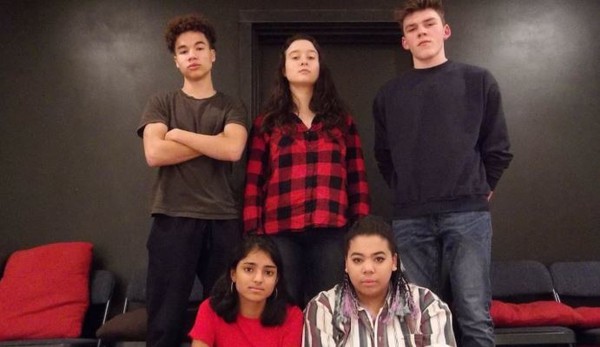Diversity is a complicated, divisive issue. Add a dose of theater politics (messy under even the best conditions) and controversy is never more than a moment away.
People have been arguing for a while about the interaction between race and casting. Recent high-profile controversies include the staging of “Porgy and Bess” by the Hungarian State Opera with a mostly white cast (contrary to the wishes of the opera’s composers, George and Ira Gershwin) and the closing of the Broadway musical “Natasha, Pierre & the Great Comet of 1812,” where a black actor who replaced the original white lead had his role taken by another white actor.
The latest controversy started at Ithaca High School in Ithaca, New York. Last fall, the school chose to produce “The Hunchback of Notre Dame” for its spring musical. In the musical, there is a character who has traditionally been portrayed as a person of color, Esmeralda. The casting guidelines for the show leave the role open to actresses of all ethnicities, yet Esmeralda has been played by a person of color in the musical’s original cast and in the Disney movie, the two most relevant productions.
On these grounds, many students at Ithaca High School believed that their Esmeralda would also be played by a person of color. Instead, a white actress was cast in the role.
A group of students began to protest the decision by writing letters, lobbying through Facebook and meeting with school administrators. The school canceled the production in response; talks are ongoing regarding a replacement musical.
As community discussions continued, media outlets such as Breitbart News picked up the story and spread it nationwide. The students and families involved in the protest began to face online harassment, including threats and personal insults. Their Facebook page, Students United Ithaca, attracted hundreds of comments, many accusing the students of racism for denying the role to the white actress simply because of the color of her skin.

Lost in the internet firestorm was any chance of a reasonable discussion about race and casting, which is a shame, since the incident sheds an especially keen light on the issue, particularly through the lens of the term “color-blind casting.” Color-blind casting involves casting without considering race.
Every theater production has certain criteria by which actors and actresses are chosen. Some of these are directly related to the role, such as acting skill, singing voice and dancing ability; others are more arbitrary, such as height or hair color.
Race is one factor which has historically been used in casting. Color-blind casting aims to remove this factor from the equation, letting performers be chosen based on their skill, not on their appearance. This opens doors for actors and actresses of other races to play traditionally white roles.
For all the students’ legitimate concerns about the production, they are arguing for something which is antithetical to color-blind casting and seemingly harmful to equality. A quote from their original letter of protest states this quite clearly.
“Before we speak further, we want to stress that the talented young woman who was cast in this role is a stellar actor, singer and dancer. She has worked hard to hone her craft and the IHS stage, or any stage, would be lucky to have her. Our concern is not with her, but with the fact that in terms of demographics, she is the wrong choice for this role.”
Under the terms of color-blind casting, demographics should not play a part in who gets chosen for any specific role. By this metric, the students’ proposal seems to be a step backward for equality. Yet the students are in truth trying to make a more nuanced point, which is clarified by the list of demands posted on the Students United Ithaca Facebook page, one of them being:
“STOP the racist and openly stated policy of “color blind” casting in the ICSD. Because of institutionalized racism this results in white children being cast in roles written as white parts and also white children being cast in roles that were specifically intended for people of color. Make no mistake, the world is not colorblind. Casting cannot be colorblind.”
In their view, there is no such thing as true color-blind casting. Race has an impact on decision making, whether or not that impact is acknowledged. According to the rest of their demands, equality cannot be reached by ignoring race; instead, it can only be accomplished by supporting those of less privileged races and encouraging what the theater industry calls ‘color-conscious casting,’ a term intended to promote diversity in the arts.
The debate between color-blind and color-conscious casting includes plenty of strong arguments on both sides. Proponents of color-conscious casting, such as the students of Ithaca High School, have some stark reality on their side.
As the students pointed out, the current theater system — from who gets trained to who gets cast, including the directors and producers themselves — is largely dominated by whiteness. Choosing actresses without consideration of race lets white actresses benefit from and maintain their privileged position. Color-conscious casting balances the scales, mitigating the benefits of privilege while supporting the underprivileged.
Where inclusive casting has an edge in practicality, color-blind casting has its own support in idealism. True equality may be unattainable, but the dream of a world where a person’s background or skin color does not limit his or her options in life is still compelling. Color-blind casting believes in that world. It places trust in the institutions and authorities of the theater world to choose actors and actresses based purely on their skill and their fitness for the role.
This debate is extremely complicated, with ties to even more controversial issues. There are no easy answers, but there is at least one thing to which both sides should agree: harassment and threats are not okay. The students of Ithaca High School were very respectful and well-spoken in their protest, whereas their critics did not show much self-restraint. In order to move forward, both sides must come amicably to the table for a reasoned debate.

















